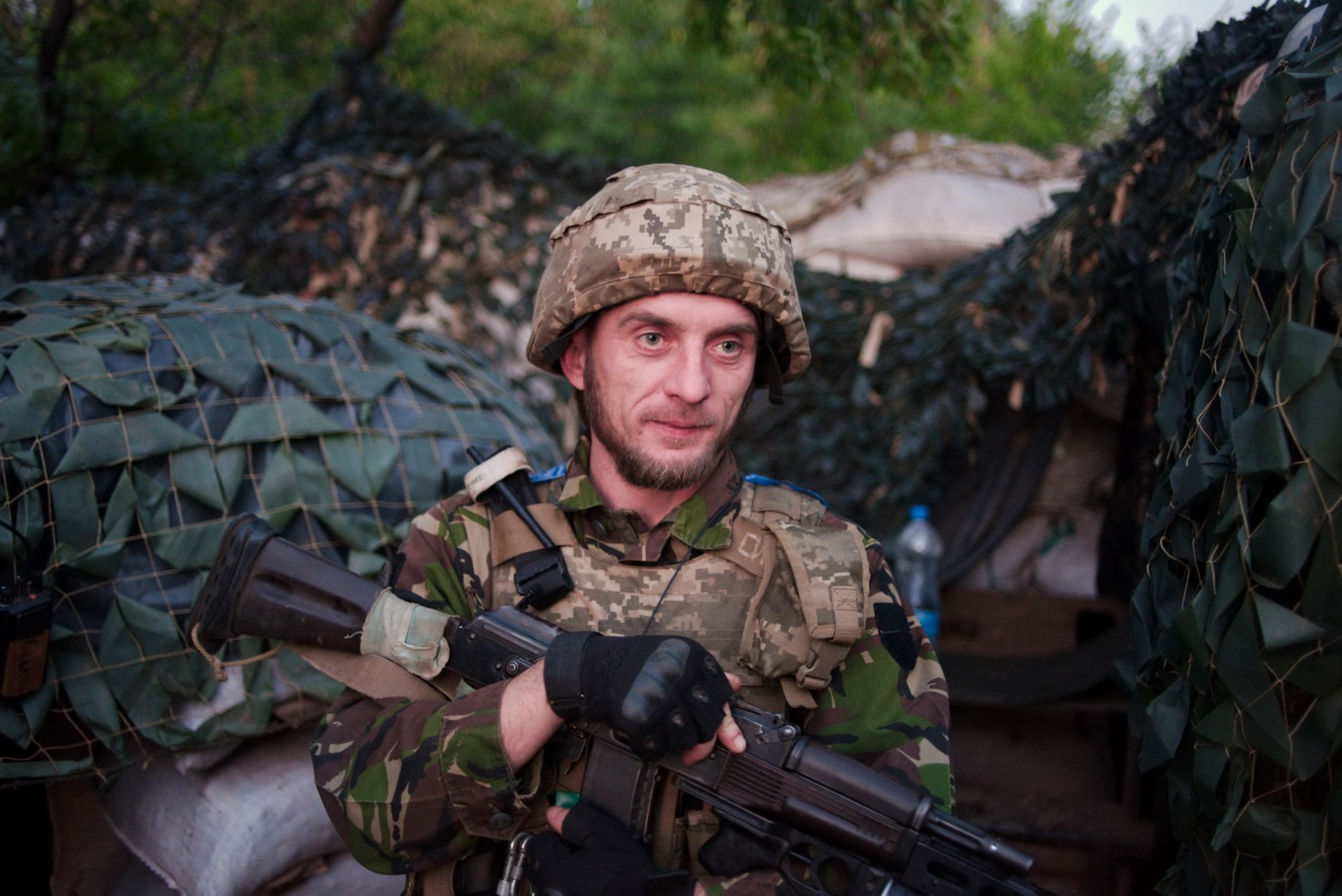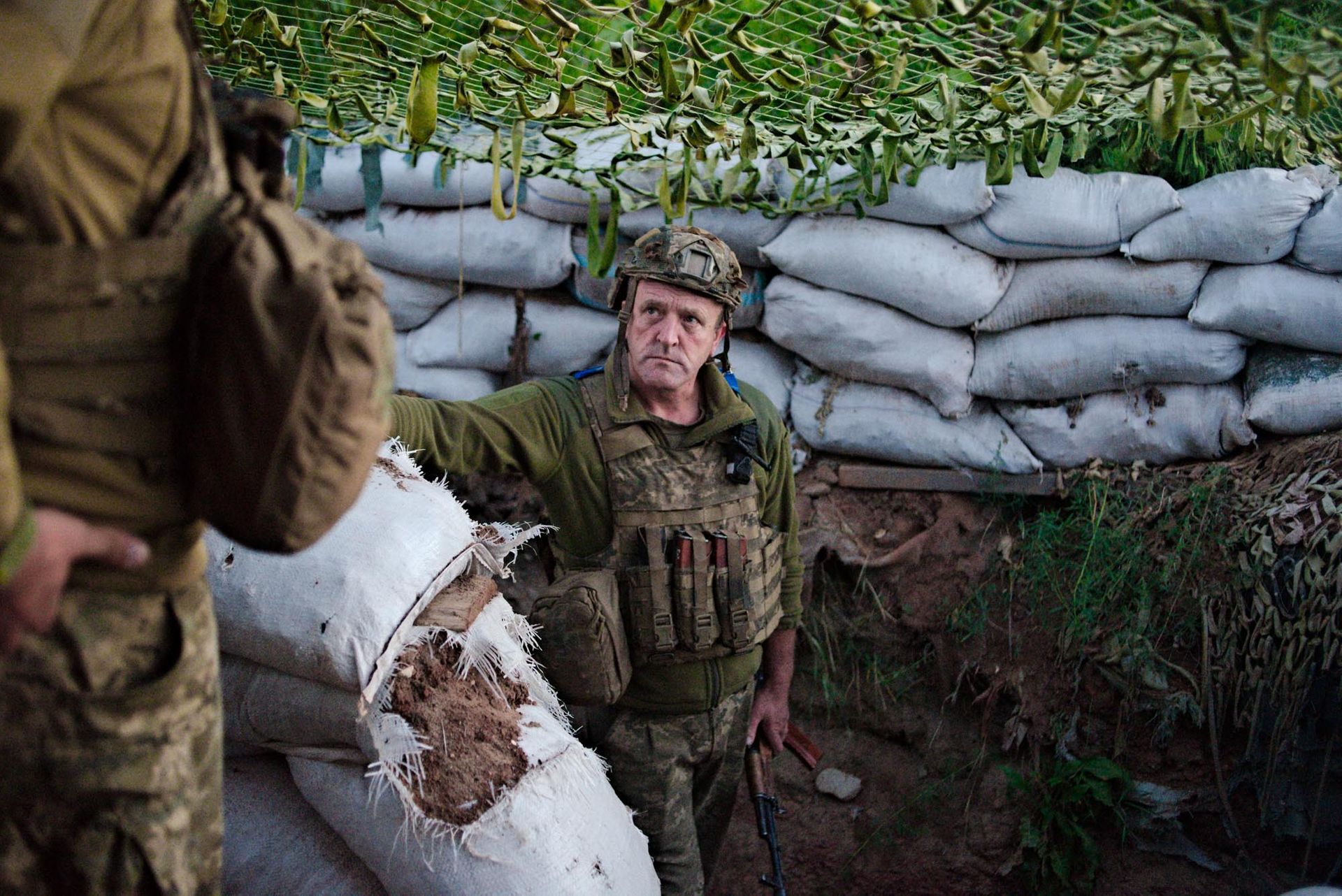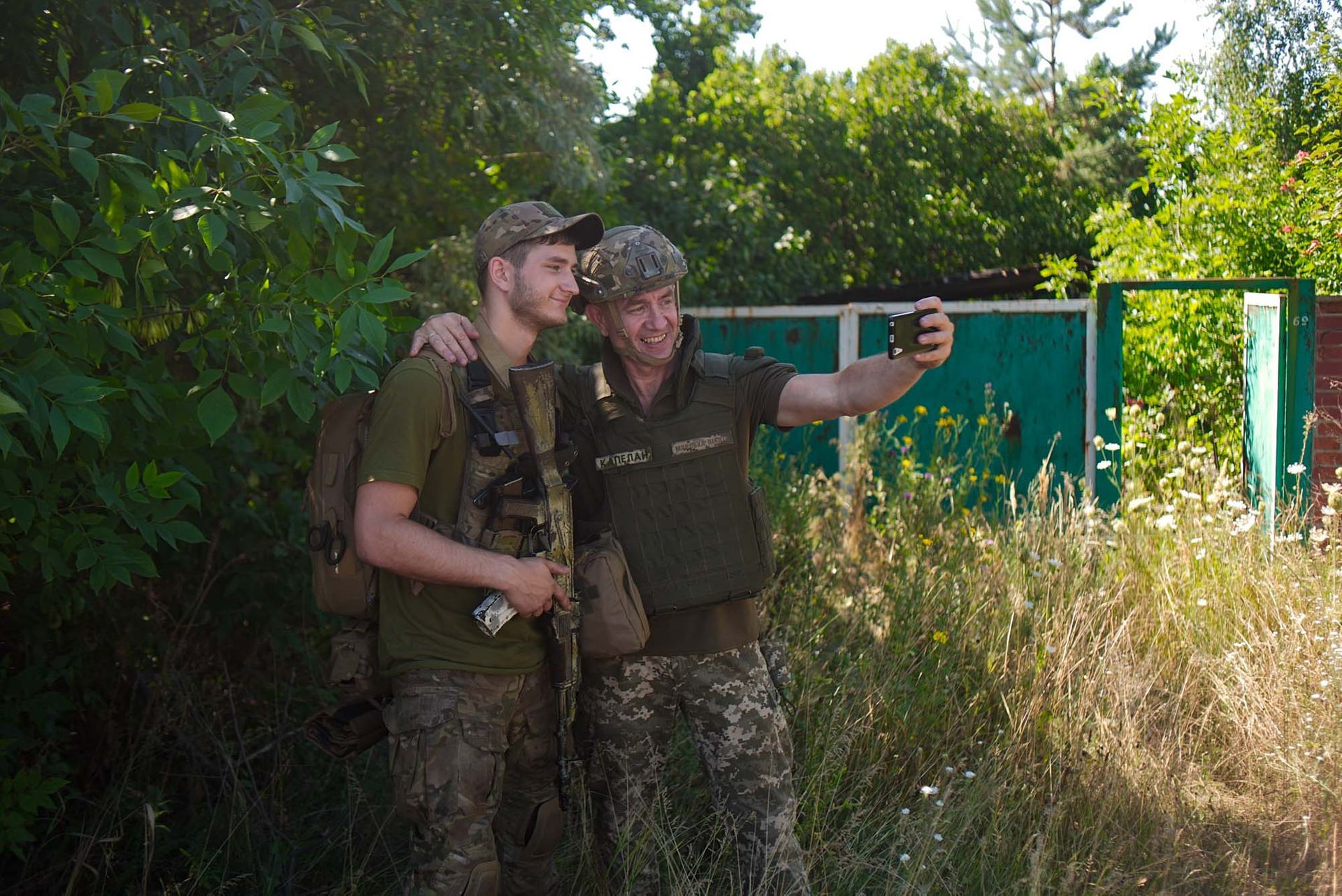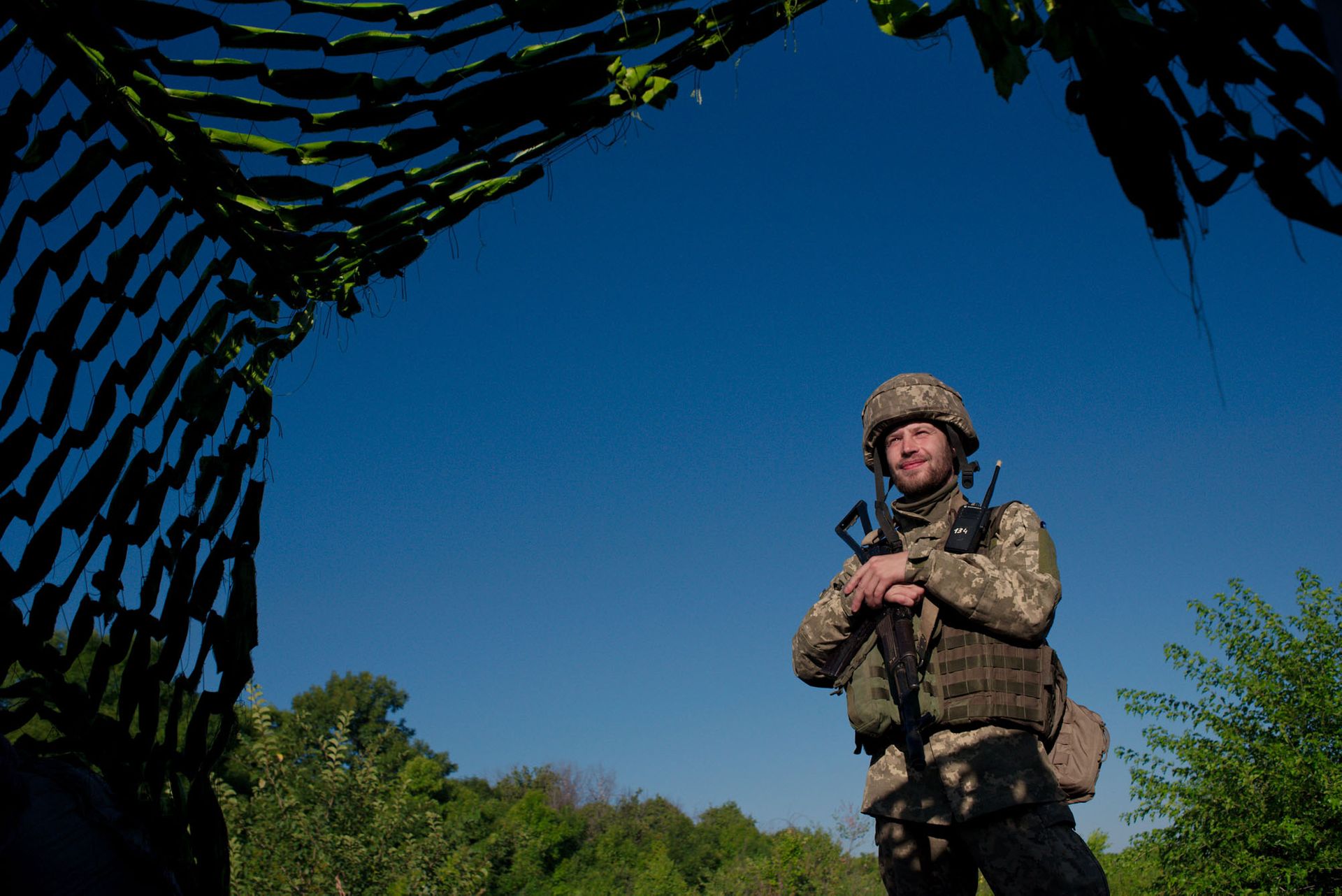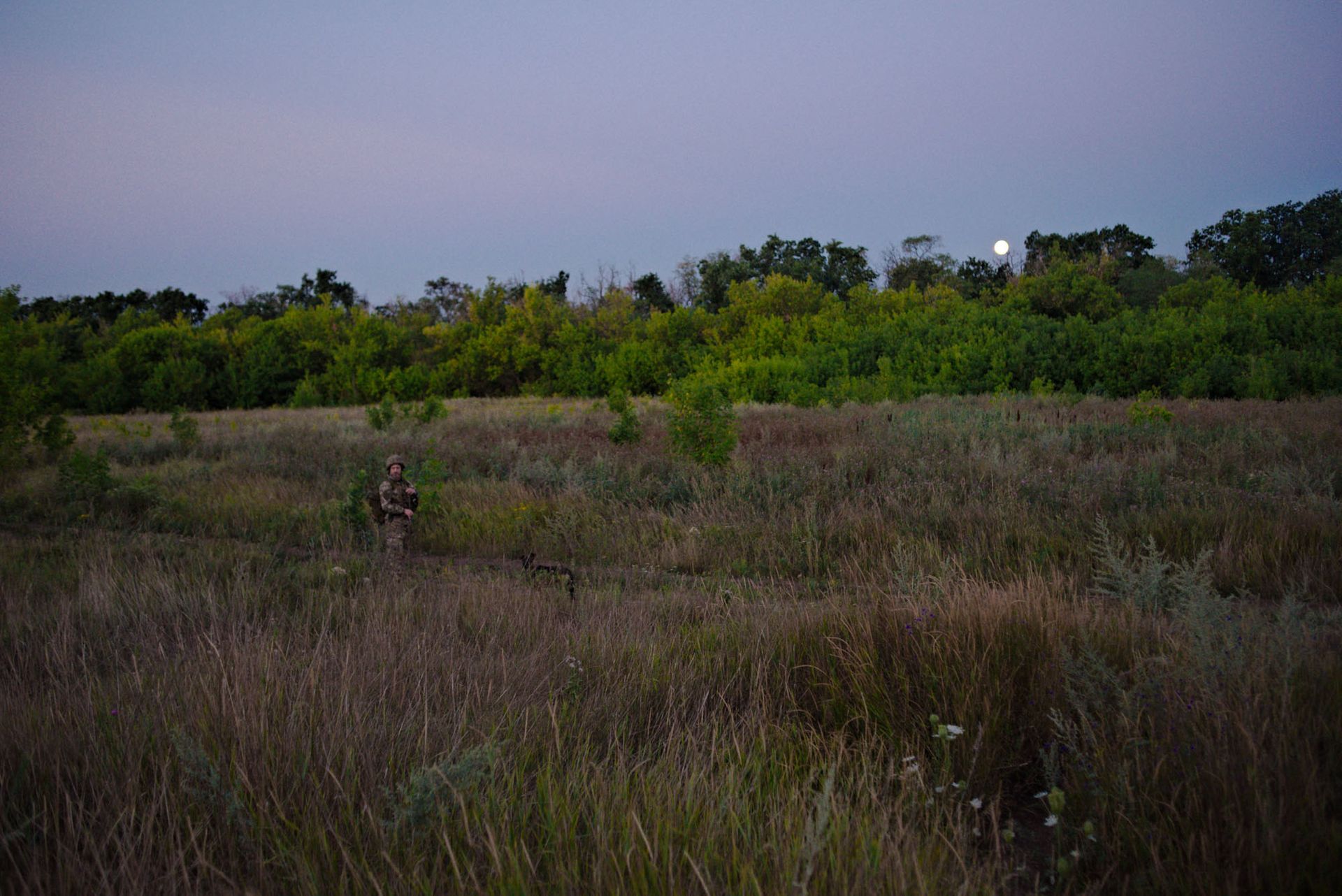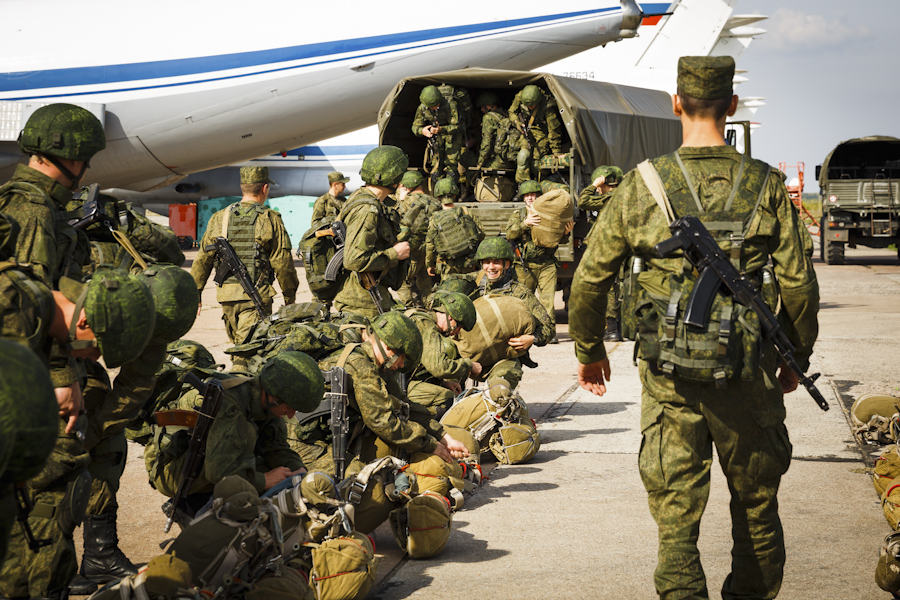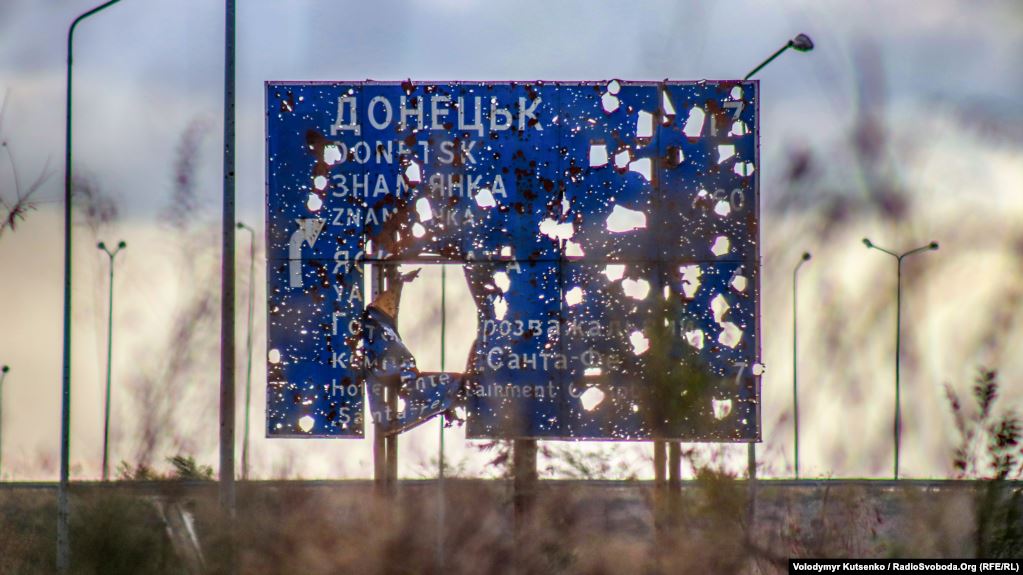Ukrainians soldiers deployed on the front lines express mixed feelings about this period and the truce. We spent three days and two nights with the Ukrainian forces to understand what the ceasefire actually entails and what individual soldiers serving in the Ukrainian Armed Forces think about it.
“One hundred and thirty-five. Four-five-zero,” a Ukrainian soldier speaks into his walkie-talkie.
This is how Ukrainian fighters periodically report on the situation at their posts located along the front line. “Four-five-zero” means that everything is calm. It is more or less quiet now along the 410-kilometre contact line that separates the Ukrainian-controlled areas from the occupied territories of Donetsk and Luhansk Oblasts.
Provocative and random gunfire… for the time being
Prior to the ceasefire, the Russian-backed militants fired at least six POM-2s (antipersonnel fragmentation mines) at Ukrainian positions near Svitlodarsk Bulge. If such a mine is not detonated, it self-destructs. According to JFO headquarters, this was done intentionally, to accuse the Ukrainian side of violating the ceasefire.
“In total, they dropped six POM-2s. We know the exact number because we heard the rounds of fire. They’re similar to the RPGs. But, we didn’t hear them land.
Yesterday or the day before yesterday, they launched 25 rounds of fragmentation grenades. Then, there was no more activity. We reported to the commander. The order was to “increase vigilance and observe the situation”. Maybe they thought that we’d respond, that something would start happening on our side. In general, it’s quite calm. Last Friday, we heard shooting on the right flank. They’re trying to provoke us…” says “Viktor”, a soldier deployed near Zolote.
“Sensei”, who serves near Svitlodarsk Bulge, says that his comrades understand very well that the enemy is just teasing them, trying to provoke them to fire back so that Russia can proclaim that Ukraine does not really want to adhere to the ceasefire, that Ukraine just wants to keep on fighting.

Responding to gunshots?
According to the ceasefire, the soldiers of the Armed Forces of Ukraine are not allowed to shoot at the enemy. They can only return fire after they have spoken to headquarters.
“Zhuk” (Beetle) points to his grenade launcher.
“See that small tube over there. It makes a lot of noise and I really enjoyed using it. Now, it’s stands over there, in the corner… shiny, spotless and worthless. Earlier, there weren’t enough shells, but now we’ve got lots, but we aren’t allowed to shoot!”
Soldier “Riddik”, who serves near Svitlodarsk Bulge, explains the procedure.
“If the enemy fires at us using heavy or small arms and we feel that there’s imminent danger, then a report is immediately submitted to headquarters. The soldier contacts headquarters, and gets permission to open fire. It doesn’t take long… maximum - 10 minutes.”
We talk with Rostyslav, deployed near Zolote, who says that the soldiers were warned that unmotivated fire would be punished. Rostyslav is a career soldier, on the front lines since 2014. He recently took a year off, but returned. “It keeps pulling me back,” he explains.
“If the situation becomes difficult, we first work it out and then discuss it. You can lose precious minutes or seconds. The time it takes to draw up a report and get a reply, it can cost a man his life!” adds Rostyslav.
On the way to the base, we hear an explosion. We ask him what it could be and how far it might be.
“No closer than two kilometres. It’s either a tripwire mine or a trench mine. We can often hear them detonating mines and digging trenches… at least three or four times a week,” he says.
Monitoring the ceasefire
Speaking about how the new ceasefire will differ from the previous ones, President Volodymyr Zelenskyy stated that Ukraine would make use of a mechanism for monitoring its observance. Thus, the supreme command of the Armed Forces of Ukraine has appointed experienced officers to each brigade, where they will be responsible for monitoring the ceasefire and carrying out outreach programs with the fighters.
“We’ve been told that this will be a real ceasefire, and not something conditional… and that the enemy has also been instructed not to provoke our units. Apparently, they’ll also be punished if they open fire.
But, a ceasefire can also raise problems. If it continues, the soldiers are more relaxed; they become more laid-back. As the old saying goes: “A soldier who has nothing to do is a potential criminal”. That’s why we try to keep everyone busy – organizing competitions, fortification works. When there was more action, we were mostly engaged in combat training. Now, we work to improve our daily living conditions.” says “Riddick”.

"A ceasefire in time of war is complete nonsense!"
During the night shift, we spoke to “Vasyl”, who is also based near Zolote.
“They used to fire from anything and everything… from machine guns to mortars. We were always ready to return fire. If we didn’t hit back, the shelling and gunfire would intensify. That’s the way it is. When you return fire, they seem to calm down a bit.
It’s more complicated now. When the enemy opens fire, you can pinpoint his location. Now, you’re in limbo. At any moment, they can crawl up closer, and you won’t have time to react!”
Mykhailo, who is posted nearby, shares his opinion. We ask him how long they think the ceasefire will last.
“I can’t say. But, I wonder to what point. How long are they willing wait [JFO command-Ed]? Until the enemy fires for the 200th time? The 300th time? Or will they say: “We’ve recorded the 200th attack, but it’s just provocation!”
In the meantime… on the other side
“They cover the areas where they work with camouflage nets. We can’t see what the enemy’s doing. Then, they move to a second point, and they cover everything again with a heavy net. Thus, they’re entrenched in their positions, and it’s certainly gonna be hard for us to smoke them out,” says “Viktor”, who serves near Zolote.
Andriy, who is on guard duty at a nearby post, says that the enemy militants are so convinced that the Ukrainian soldiers will not shoot that they have started walking around in full view.
“How are we supposed to put up with that?!” he says indignantly.
“Yarmak”, who serves near Svitlodarsk Bulge, says he often hears armoured vehicles from the occupied town of Dolomitne. He presumes that the militants did not withdraw their heavy equipment from this area.
“Yarmak” says that his comrades have been working hard for the past three months digging and solidifying their new positions, so now they have a chance to rest. However, he is convinced that the ceasefire will not hold.
“For six years, they haven’t been willing to make peace, so why should they now? The ceasefire will end soon… and tragically. One day, a mine will fly into the dugout, and that will be the end.”
A politically-motivated ceasefire
“The Armed Forces of Ukraine are ready to defend their country. We swore allegiance to the people of Ukraine, and not to some clans or interest groups. Ukrainians must know that everything is under control; the ammunition is in place and our weapons are operational.” says Kostiantyn, a defender serving near Svitlodarsk Bulge in Donetsk Oblast.
He has been fighting since 2014, but says that this is the first time the ceasefire has lasted so long.
“This is unusual for the soldiers, because they’ve become so used to constant shelling and provocations by the enemy. A ceasefire in time of war is complete nonsense,” he shrugs his shoulders.
Kostiantyn is very surprised by this sudden silence and wonders what the militants were promised (or what ploys were used to scare them). After all, these Russian-backed forces have not been an outstanding example of virtue and discipline! However, he is more concerned about what is taking place in Ukraine.
“We’re on the verge of municipal elections, and someone somewhere’s shaping the situation for their own benefit. Throwing a spanner in the works…The government’s also fighting for the electorate. We don’t want politicians to use the army as a tool,” he says.
**********
Near Zaitseve, we stop to talk to “Doc”, a combat medic. He was a friend and colleague of Mykola Ilin, who was killed during an evacuation mission, when the Russian mercenaries opened fire on the evacuation team.
“They [the militants] were just lucky. If not for the ceasefire, we’d see another picture. But, it’s so, sadly enough…” sighs “Doc”.
In his opinion, the ceasefire is simply a component of the war, so it should not be considered a betrayal, nor should we place all our hopes on it.
“Doc” does not like the idea of withdrawing troops or weapons in the Zaitseve area. He concludes philosophically:
“I’m an ordinary soldier. I see a tree in front of me, but they [Ukraine’s political leaders-Ed] see a whole forest.”


